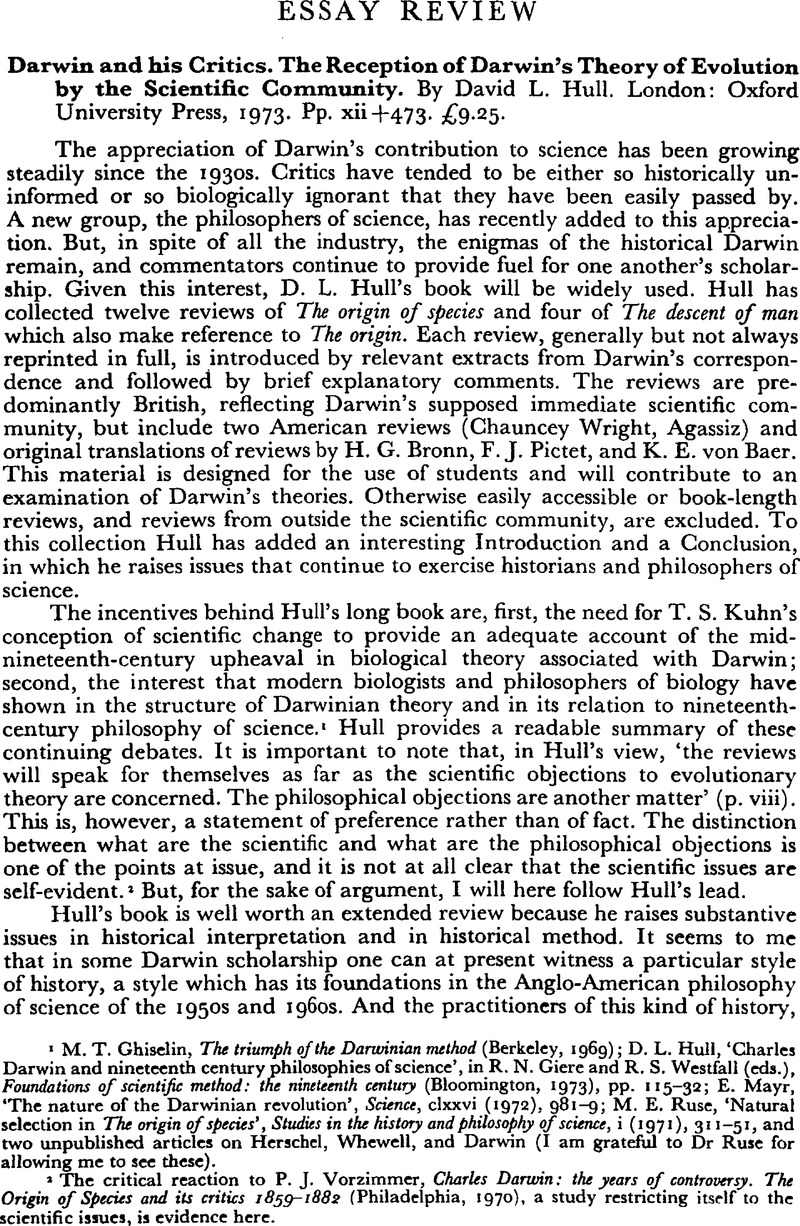Article contents
Darwin and his Critics. The Reception of Darwin's Theory of Evolution by the Scientific Community
Published online by Cambridge University Press: 05 January 2009
Abstract

- Type
- Essay Review
- Information
- Copyright
- Copyright © British Society for the History of Science 1974
References
1 Ghiselin, M. T., The triumph of the Darwinian method (Berkeley, 1969)Google Scholar; Hull, D. L., ‘Charles Darwin and nineteenth century philosophies of science’, in Giere, R. N. and Westfall, R. S. (eds.), Foundations of scientific method: the nineteenth century (Bloomington, 1973), pp. 115–32Google Scholar; Mayr, E., ‘The nature of the Darwinian revolution’, Science, clxxvi (1972), 981–9CrossRefGoogle Scholar; Ruse, M. E., ‘Natural selection in The origin of species’, Studies in the history and philosophy of science, i (1971), 311–51CrossRefGoogle Scholar, and two unpublished articles on Herschel, Whewell, and Darwin (I am grateful to Dr Ruse for allowing me to see these).
2 The critical reaction to Vorzimmer, P. J., Charles Darwin: the years of controversy. The Origin of Species and its critics 1850–1881 (Philadelphia, 1970)Google Scholar, a study restricting itself to the scientific issues, is evidence here.
3 Direct responses to Kuhn on the topic of Darwin have been disappointing: see Ghiselin, M. T., ‘The individual in the Darwinian revolution’, New literary history, iii (1971), 113–34CrossRefGoogle Scholar; Greene, J. C., ‘The Kuhnian paradigm and the Darwinian revolution in natural history’, in Roller, D. H. D. (ed.), Perspectives in the history of science and technology (Norman, Oklahoma, 1971), pp. 3–37Google Scholar; Ruse, M. E., ‘The revolution in biology’, Theoria, xxxvi (1970), 1–22Google Scholar, and ‘Two biological revolutions’, Dialectica, xxv (1971), 17–38.Google Scholar I wonder about the point of these analyses if what Hull says is correct: ‘as these authors have discovered, the major stumbling block in their enterprise is deciding exactly what the Kuhnian analysis of science actually is’ (p. 453).
4 Cf. p. 117: ‘[the term “species”] was being transferred from one scientific theory to another, from natural theology and a metaphysics of essences to evolutionary theory’.
5 The point is clearly explained by Fawcett, Henry (pp. 279–80)Google Scholar; cf. Wollaston, T. V.'s quotation of Whewell (p. 127).Google Scholar
6 I owe this argument to Michael Bartholomew.
7 Huxley, T. H., ‘On the reception of the Origin of species’, in Darwin, F. (ed.), The life and litters of Charles Darwin (3 vols., London, 1888), ii. 179–204 (194).Google Scholar Cf. Hooker, J. D.'s view (p. 84)Google Scholar that the special creation theory must be tested by observation.
8 Powell, Baden, ‘On the study of the evidences of Christianity’, in [Temple, F. et al. ], Essays and reviews (London, 1860), pp. 94–144.Google Scholar
9 To take the date 1859 as the turning point is again to oversimplify; some demarcation, for instance in the thought of Baden Powell, was already evident. In relation to the possible scientific community in 1859, it is interesting to note how established reviewers objected to Darwin's well-known appeal to the younger generation: cf. Sedgwick, (p. 158)Google Scholar, Owen, (p. 192)Google Scholar, Haughton, (p. 224).Google Scholar
10 Letter to Theodor Gomperz, 1854, quoted in Packe, M. St J., The life of John Stuart Mill (New York, 1970), p. 253.Google Scholar
11 Ghiselin, M. T., ‘Mr. Darwin's critics, old and new’, Journal of the history of biology, vi (1973). 155–65 (155).CrossRefGoogle Scholar
12 Popper, K. R., The open society and its enemies (2 vols., London, 1967)Google Scholar; Mayr, E., ‘Agassiz, Darwin and evolution’, Harvard library bulletin, xiii (1959), 165–94.Google Scholar Hull has further developed the argument in ‘The effect of essentialism on taxonomy—two thousand years of stasis’, British journal for the philosophy of science, xv (1965), 314–26, and xvi (1965), 1–18Google Scholar, and ‘The metaphysics of evolution’, The British journal for the history of science, iii (1967), 309–37.Google Scholar
13 I have reviewed the context of this argument in Smith, R., ‘The background of physiological psychology in natural philosophy’, History of science, xi (1973), 75–123.CrossRefGoogle Scholar
14 This point is well made by Hull in reference to Sedgwick, (p. 170)Google Scholar; however, I think Sedgwick's understanding of the relations between God, law, and nature was less interventionist than Hull suggests.
15 The relevant and illuminating definition of positivism was given by Mill, : ‘Auguste Comte and positivism’, in Essays on ethics, religion and society [Collected Works of John Stuart Mill, vol. x] (Toronto, 1969), pp. 261–368 (256–6).Google Scholar
16 Burrow, J. W., Evolution and society. A study in Victorian social theory (Cambridge, 1966)Google Scholar; Mandelbaum, M., History, man and reason. A study in nineteenth century thought (Baltimore, 1971)Google Scholar; Peel, J. D. Y., Herbert Spencer. The evolution of a sociologist (London, 1971)Google Scholar; Young, R. M., ‘Malthus and the evolutionists: the common context of biological and social theory’, Past and present, no. 43 (1969), 109–45CrossRefGoogle Scholar, and ‘Darwin's metaphor: does nature select?’, The monist, Iv (1971), 442–503Google Scholar, and ‘The historiographic and ideological contexts of the nineteenth century debate on man's place in nature’, in Teich, M. and Young, R. M. (eds.), Changing perspectives in the history of science. Essays in honour of Joseph Needham (London, 1973), pp. 344–438.Google Scholar
- 1
- Cited by




